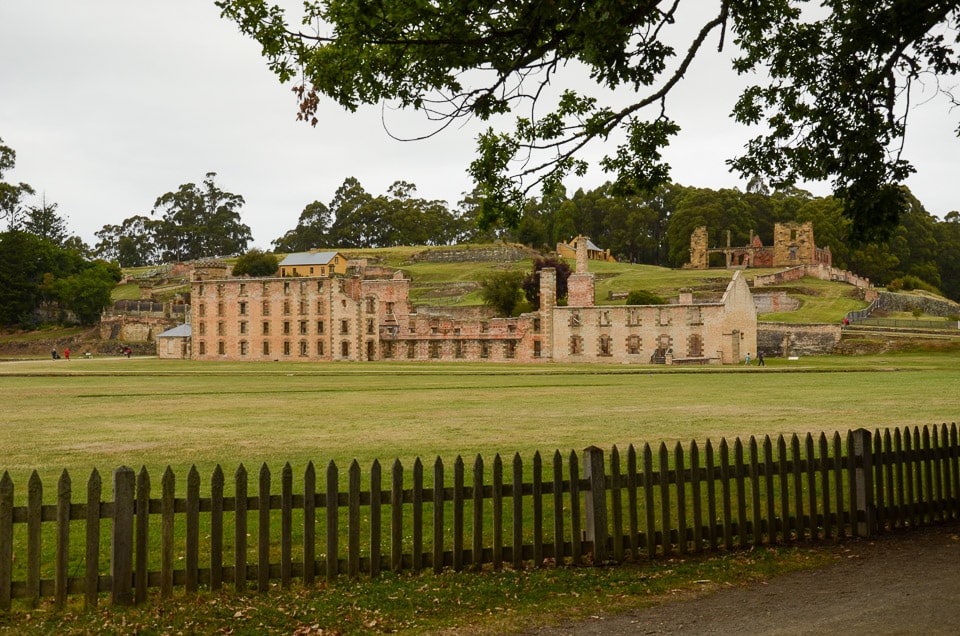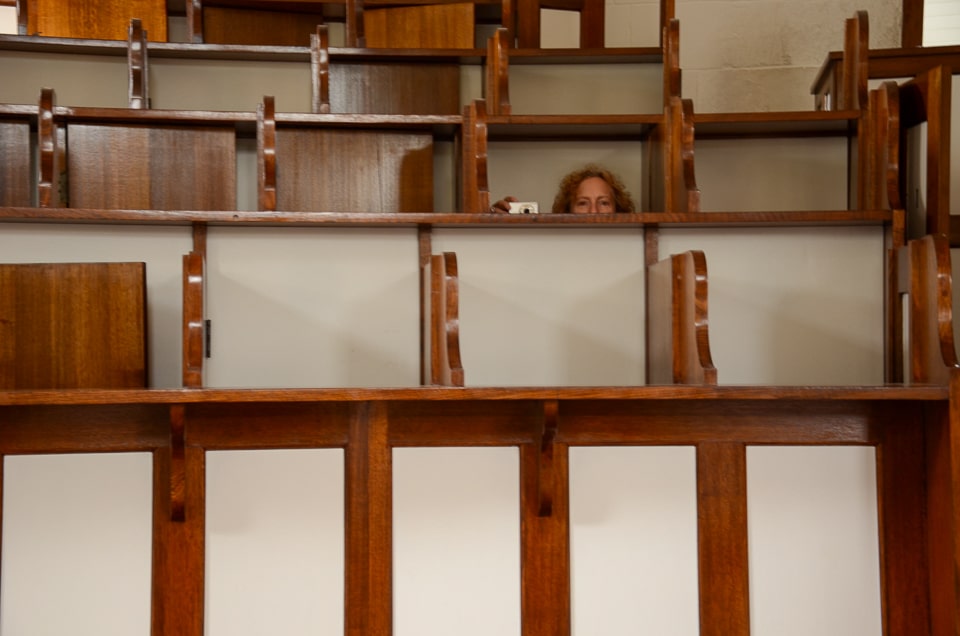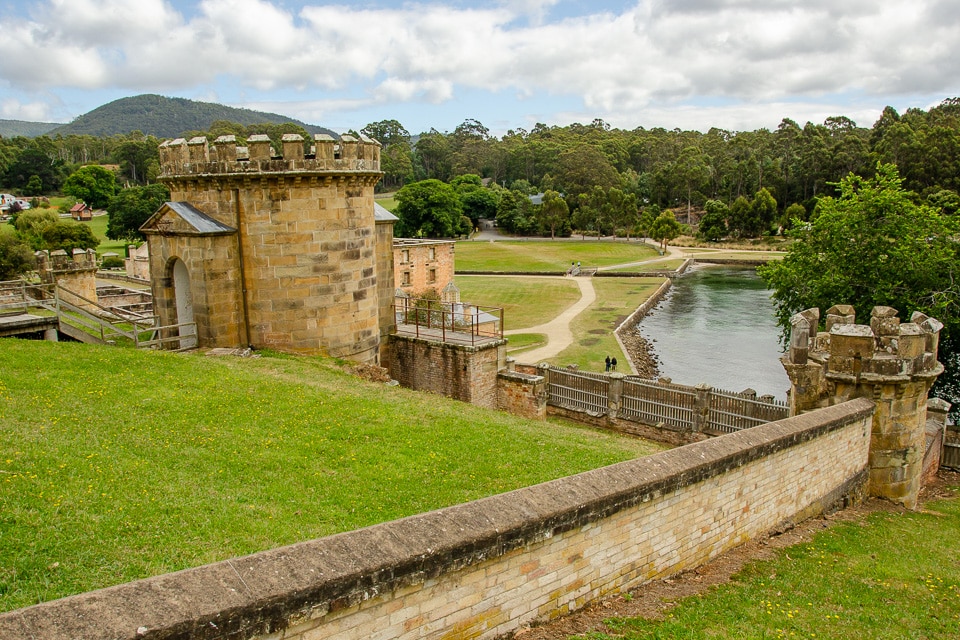Visiting the Port Arthur, Australia Historic Site

Note: This is an update to a post originally published in 2012.
It was a dreary windy day when we toured the Port Arthur penitentiary site in Southern Tasmania. We were told the weather was unusual for summer here, but it seemed somehow fitting when visiting a site of such misery.
Australia, as most know, was founded as a penal colony. Unlike the United States, the first people to come here were not colonists or people fleeing oppression in Britain. They were people bringing oppression from Britain, in the person of 160,000 prisoners shipped here between 1788 and 1868 in order to make the Pacific Ocean, in Australian historian Robert Hughes’s words “a wall 14,000 miles thick” between England and its troublesome citizens who received a sentence of transportation to Australia. (To be accurate, I should probably mention here that England also sent 60,000 prisoners to North America in the seventeenth and eighteenth centuries, but that option was cut off to them by the American Revolution.)
Port Arthur in Tasmania was originally founded in 1830 as a lumber milling site, but its location on the remote Tasman peninsula made it the ideal place for a prison. It was soon converted into Australia’s largest and most notorious prison colony.
In order to pay for the cost of providing for the criminals it housed, Port Arthur became a center of prison industries such as ship-building, shoe-making, metal-work, and brick-making. Eventually some of these industries were shut down because the local artisans could not compete with the “free” labor provided by the prisoners.
It was a bit surprising to read prisoner records for many of those sent to Port Arthur, and not just because there were at least nine among the lists of Port Arthur convicts’ names who had the surnames of my Irish ancestors. Port Arthur is at the end of a remote peninsula in Southern Tasmania, about an hour and a half’s drive from Hobart. The vast prison complex there came to be the most notorious of the Australian prison installations, due to its size and to the fact that a surprising number of men sent there went insane due to the unusually cruel treatment they received.
But of course, the assiduous records of the lashes men received, or the meager rations they had to eat, were not unexpected. Nor were the accounts of the terrible afflictions of those who worked as “underdogs” in the sawmills (blindness and emphysema) or those who were tossed into solitary confinement until they went insane.

Nor were the ruins of stone cold cells that were too short for a man over five foot seven inches tall to stand in, or the thick chains many wore constantly. (Better behaved prisoners got lighter, or no, chains.) Even the “Separate Prison,” which was a block of cells where men were kept in solitary confinement, often in the dark, and were not permitted to see any human other than the chaplain for months at a time, were expected. The Separate Prison has recently been restored, at a cost of over five million dollars, so you can see in detail the insidious methodology which was used to “grind men good”. What actually happened, often, was that they ended up in the Lunatic Asylum, which conveniently was located right next door.
What was remarkable is what got you sent here. When you come into the Port Arthur site, you’re given a playing card that corresponds to a particular inmate. My deuce of clubs corresponded to a boy of 14 who had been sentenced to seven years incarceration and transportation to Australia for stealing a handkerchief. Many other records that are on view throughout the site list similar trifling offenses that describe desperate poverty much more than criminal tendencies.
The Port Arthur prison was closed in 1877 and the area was redeveloped as a town. Fires in 1895 and 1897 gutted many of the original prison buildings.
We’ve now seen three Australian penal colony sites: the Women’s Factory in Hobart, Port Arthur, and Sarah Island in Macquarie Harbour near Strahan. For a long time, Australia let the sites go derelict as if to deny its history. And, to be truthful, there were many more immigrants to Australia due to the gold rush than were brought here as prisoners. To also fill out the story, those “free” Australians eventually got transportation halted – although not for altruistic motives. They didn’t want “criminals” in their midst any more than the English did, and, more important, it was very hard for free men who were earning and paying wages to compete with the enterprises who took advantage of the slave labor provided by the penal colonies.
But, in the last 35 years or so, the Australians have realized that the penal sites are valuable to them as tourist attractions. And so, restoration, especially at Port Arthur, has progressed nicely. The Port Arthur site and the Cascades Female Factory are both listed as UNESCO World Heritage Sites. Sarah Island is within the Tasmanian Wilderness UNESCO Site.

The ruins at Sarah Island are worth the tour, too. They’re only reached by boat, and it cost $99 when we were there in 2012. Don’t bother with paying for the tour at the Cascades Female Factory in Hobart. There is almost nothing left there to see, and you’re much better off saving the $15 fee to buy another beer at the Cascade Brewery tour just a couple hundred meters up the street.
The entry fee to the Port Arthur Historic Site is $47 (AUD) per adult and can be purchased in advance here. Included in basic admission is a self-guided tour. Other guided tours are available.
To get to Port Arthur from Hobart, follow the A3 Tasman Highway through Cambridge, across the bridge, right at Sorrell onto the A9 Arthur Highway. The drive takes about an hour and a half.
January 26, is Australia Day. That date in 1788 was the day the first ships carrying just over 700 prisoners landed in what is now Sydney Harbor.
The Australian convict sites are a UNESCO World Heritage site in Australia. Click the link to see a list of all the Australian UNESCO World Heritage sites, with links to posts about the ones we’ve visited.
You can click the link above, or use this widget below to start the process of getting a visa for any country.
When you’re thinking of traveling, your first stop should be our Travel Resources page, where we list all the essentials you need to make your travels easier, cheaper, safer, and more fun.
You can also help yourself get ready for your travels by reading our Get Started Planning Your Trip Now page.
We love traveling–with the right gear. We’ve gathered a lot of the stuff we use to make travel more pleasant and efficient all on one page. Shop our Travel Past 50 Amazon page to find our favorite gear. If you purchase something from the store, Travel Past 50, as an Amazon affiliate, may receive a small commission at no extra charge to you. Thanks.
We never leave home without our travel insurance. Nor should you. Search for the travel insurance from Allianz that best meets your needs, whether it be an annual plan or a single trip.
You can see (and buy prints) of most of our travel photos in one place on this page.
Note: This post and other posts on TravelPast50.com may contain paid or affiliate advertising links. As an Amazon Associate we earn from qualifying purchases.
Editor’s Note: Today’s guest column on the potential for a “business bonanza” in 2025 comes from Manward Press Chief…
Copyright © 2025 Retiring & Happy. All rights reserved.








